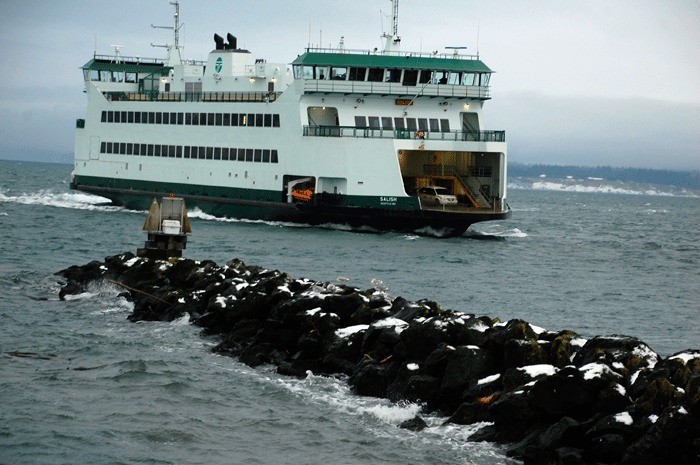Washington State Ferries’ funding problems are now so dire that without additional revenue the state agency would need to close five routes, including the Port Townsend-to-Coupeville run, to make ends meet.
That was one of two doomsday scenarios state Department of Transportation Secretary Paula Hammond presented to key transportation legislators in Olympia early last month. Neither is a working plan, but were meant to demonstrate the gravity of the problem.
“We are not talking runs anymore, we are talking routes,” said Hammond, in a presentation to the Senate Transportation Committee, headed by 10th District Democrat Mary Margaret Haugen.
Hammond also gave a presentation to the House Transportation Committee.
Hammond made it clear that closing routes was a worst case scenario, as was another plan that would severely reduce state road maintenance. Under that proposal, the 93 percent of state roads that are presently in fair and good condition would be reduced to 30 percent over 10 years.
Hammond said neither was a “reasonable solution” for a healthy economy and ferry officials have since endorsed Gov. Chris Gregoire’s proposed solution for a mix of fee and tax increases.
However, that the Port Townsend route would even be considered on a list of ferry closures is discouraging for some Coupeville business leaders.
“It’s very disappointing to hear we’re included in that,” said Lynda Eccles, director of the Central Whidbey Chamber of Commerce.
“It would affect the whole of Whidbey Island,” she said.
No more money
Washington State Ferries’ budget has for years been supplemented with money from the motor vehicle fund. Since 2000, a total of about $900 million has been transferred. While that has worked as an effective stopgap in the past, the fund is now nearly depleted, according to Hammond.
Without new revenue, the agency is looking at a $1.3-billion shortfall over the next 10 years, beginning at the start of the next biennium in 2013. The funding gap is so large, the department would need to shut down five routes to make ends meet, she said.
Along with the Port Townsend-to-Coupeville route, those eyed for closure include Sidney to the San Juan Islands, Seattle to Bremerton, Southworth to Vashon and Point Defiance to Tahlequah.
The routes were selected based largely on fare-box returns, the percent of operating expenses paid for by fares.
According to Jean Baker, deputy chief of finance and administration for Washington State Ferries, some runs have a rate return of nearly 100 percent. They were selected to remain over other routes with less-than-stellar returns, Baker said.
Port Townsend has a return of about 37 percent, which makes it the lowest of the entire ferry system.
Ferry spokeswoman Marta Coursey said another consideration in choosing which routes to close was based on its importance as a transportation link. For example, Deception Pass bridge and the Clinton-to-Mukilteo ferry route means Whidbey Island has two alternatives to getting on and off the island.
Coursey said ferry officials know that route closures would be devastating for some communities and reminded that this was an attempt to make clear just how bad the department’s funding problems really are.
“It’s a serious exercise but it’s illustrative of what would happen if we don’t get appropriate funding levels,” Coursey said.
She also said Gregoire’s pitched fix of a series of fee and tax increases would address the department’s funding woes. Department leaders are hopeful they will be adopted by the Legislature, Coursey said.
Not on my watch
Eccles said she also is hopeful lawmakers will endorse the proposed solution. With the recent arrival of new ferries, Whidbey Island is only just beginning to recover from the loss of the Steel Electrics in late 2007, she said.
“Everyone would take a hit yet again,” she said.
She also said that, despite assurances that this was just an illustration of a worst case scenario, ferry officials would take the time to identify specific routes for closure based on select criteria makes her nervous.
Sen. Haugen, D-Camano, said route closures are one thing people shouldn’t lose sleep over. As chairwoman of the Senate Transportation Committee, she assured that no routes will be canceled on her watch, especially the Port Townsend run.
“It’s not going to happen as long as I’m here,” Haugen said.
“I’ve worked hard to get those boats,” she said, referring to three new ferries built to replace the Steel Electrics.
Some of her Republican counterparts in the house share similar opinions. Rep Barbara Bailey, R-Oak Harbor, said she would not support a route closure in her district. The lawmaker took issue with Port Townsend being named, saying the run has been “critically injured” which no doubt affected its fare returns.
“It’s not a fair evaluation of the run,” Bailey said.
According to ferry statistics, fare-box recovery prior to the retirement of the Steel Electrics was 49 percent. That compares to this year’s 37 percent return. All the proposed route closures had a ratio this year that was below 50 percent. The only exception was the Anacortes-to-Sidney run, which saw a 63 percent return.
With Gregoire’s mixed bag of fee and tax increases, ranging from a $1.50 charge per refined barrel of oil to an annual $100 fee for electric vehicles, Haugen and Bailey agree and disagree on various elements to the proposal.
While Haugen said she wasn’t ready to support everything, she isn’t adamantly opposed to any one element either. Bailey, an outspoken critic of tax hikes, said she also is willing to consider some fee increases but needs to meet with ferry leaders before making up her mind.



